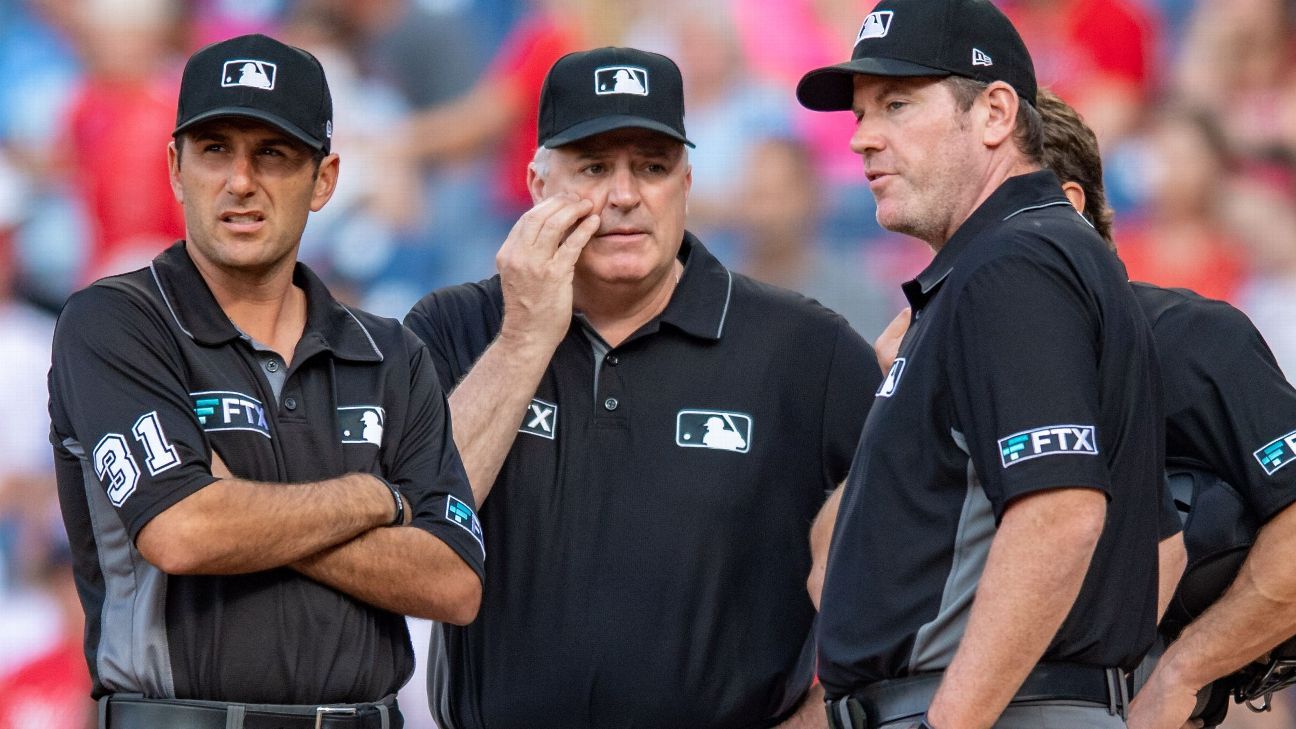
CHICAGO -- The Major League Baseball Umpires Association released a tersely worded statement Wednesday regarding the criticism umpires are receiving due to the home-plate collision rule.
The rule has been a topic around the game after multiple video reviews have resulted in overturned out calls at home plate recently, including in Tuesday's game between the Cleveland Guardians and Detroit Tigers.
The statement, obtained by ESPN on Wednesday, said that "it is the catcher's responsibility not to position himself so as to block home plate without the ball.
"This rule change was adopted after Buster Posey was involved in a home plate collision and suffered a severe leg injury. The Players Association and the owners decided to protect their key assets (players) and adopted the home plate collision rule that players are now complaining about."
The umpires contend they are simply upholding the rule that's on the books, one that the league sent a memo to teams about earlier this month. The memo came with illustrations and reminders about how and where a catcher can and cannot set up as he receives the ball from a fielder.
"It's simple: don't block home plate without possession of the baseball or change the rule," the umpire's statement said.
The latest on-field controversy occurred in the top of the first inning on Tuesday in Cleveland. Guardians catcher Austin Hedges caught a throw from shortstop Tyler Freeman as Javier Baez slid home. Baez was called out, but video review overturned the call, indicating the "catcher did not give the runner a lane." The Tigers scored three runs in the inning, going on to beat the first place Guardians, 4-3.
"First of all, it cost the game," Hedges said after the loss. "It's a play that's been called a few times now recently that really has never been called before. ... There's plays at home that are beating the runners and for 150 years you're out. And now, we're calling some type of rule that is really tricky to define."
Video review has overturned eight calls at home this season, the most since 2014, the first year teams could challenge the call. The most recent ones prompted teams to ask the league for clarification, which it provided.
"Recently we have seen catchers taking advantage of runners they expect will slide by moving into the running lane without possession of the ball in violation of Rule 6.01(i)(2)," the league memo said. "Such conduct only invites runners to collide with catchers, causing potential injury to players in a manner that the rule was designed to prevent. Catchers may not block the pathway of runners unless they are in possession of the ball, or in the act of fielding the ball."
Umpires say they feel caught in the middle, claiming it's not their job to call the blocking rule live but to let video review in New York -- which is manned by current umpires -- handle it.
Their statement then extended beyond the home plate collision rule.
"It is also inaccurate to say that Major League Baseball umpires are not held accountable. It is often said of our profession that 'umpires are expected to be perfect from the start and to get better from there.'
"Like players, our mistakes are subject to intense public scrutiny and we are also held accountable by our employer in performance evaluations. Although we don't always know in real time if our calls are correct, we review them closely following the game and try to learn from any mistakes."















 Phone: (800) 737. 6040
Phone: (800) 737. 6040 Fax: (800) 825 5558
Fax: (800) 825 5558 Website:
Website:  Email:
Email: 






